- Clone
- JES3-19F1 (See other available formats)
- Regulatory Status
- RUO
- Other Names
- Interleukin 10, B cell derived T cell growth factor (B-TCGF), Cytokine synthesis inhibitory factor (CSIF), T-cell growth inhibitory factor (TGIF)
- Isotype
- Rat IgG2a, κ
| Cat # | Size | Price | Quantity Check Availability | ||
|---|---|---|---|---|---|
| 506813 | 100 µg | $237.00 | |||
| 506814 | 1 mg | $688.00 | |||
Select size of product is eligible for a 40% discount! Promotion valid until December 31, 2024. Exclusions apply. To view full promotion terms and conditions or to contact your local BioLegend representative to receive a quote, visit our webpage.
IL-10 was originally described as Cytokine Synthesis Inhibitory Factor (CSIF) by virtue of its ability to inhibit cytokine production by Th1 clones. IL-10 shares over 80% sequence homology with the Epstein-Barr virus protein BCRFI. The biological activities of IL-10 include inhibition of macrophage-mediated cytokine synthesis, suppression of the delayed type hypersensitivity response, and stimulation of the Th2 cell response, which results in elevated antibody production. The JES3-19F1 antibody reacts with human and viral interleukin-10 (IL-10). The JES3-19F1 antibody can neutralize the bioactivity of natural or recombinant IL-10.
Product Details
- Verified Reactivity
- Human
- Antibody Type
- Monoclonal
- Host Species
- Rat
- Immunogen
- COS-expressed recombinant human IL-10
- Formulation
- 0.2 µm filtered in phosphate-buffered solution, pH 7.2, containing no preservative.
- Preparation
- The Ultra-LEAF™ (Low Endotoxin, Azide-Free) antibody was purified by affinity chromatography.
- Concentration
- The antibody is bottled at the concentration indicated on the vial, typically between 2 mg/mL and 3 mg/mL. Older lots may have also been bottled at 1 mg/mL. To obtain lot-specific concentration and expiration, please enter the lot number in our Certificate of Analysis online tool.
- Storage & Handling
- The antibody solution should be stored undiluted between 2°C and 8°C. This Ultra-LEAF™ solution contains no preservative; handle under aseptic conditions.
- Application
-
ELISA Capture - Quality tested
IHC-F, ICC, WB - Reported in the literature, not verified in house - Recommended Usage
-
Each lot of this antibody is quality control tested by ELISA assay. For ELISA capture applications, a concentration range of 2.0 - 6.0 µg/ml is recommended. To obtain a linear standard curve, serial dilutions of IL-10 recombinant protein ranging from 250 to 2 pg/ml are recommended for each ELISA plate. It is recommended that the reagent be titrated for optimal performance for each application.
- Application Notes
-
ELISA or ELISPOT Capture1-4: The Purified JES3-19F1 antibody is useful as the capture antibody in a sandwich ELISA or ELISPOT assay, when used in conjunction with the biotinylated JES3-12G8 antibody (Cat. Nos. 501502 & 501503) as the detecting antibody. The Ultra-LEAF™ Purified antibody is suggested for ELISPOT capture. For use as an ELISPOT capture antibody, a concentration range of 4.0 - 8.0 µg/ml is recommended.
Flow Cytometry: The fluorochrome-labeled JES3-19F1 antibody is useful for intracellular immunofluorescent staining and flow cytometric analysis to identify IL-10 -producing cells within mixed cell populations. For intracellular cytokine staining protocol, please visit www.biolegend.com and click on the support section.
Neutralization1,2: The Ultra-LEAF™ Purified antibody (Endotoxin <0.1 EU/µg, Azide-Free, 0.2 µm filtered) is recommended for neutralization of human IL-10 bioactivity (Cat. Nos. 506814 & 506815).
Additional reported applications (for the relevant formats) include: Western blotting, immunohistochemical staining5,6 of paraformaldehyde-fixed, saponin-treated frozen tissue sections, and immunocytochemistry.
Note: For testing human IL-10 in serum or plasma, BioLegend's ELISA Max™ Sets (Cat. No. 430601 to 430606) are specially developed and recommended. -
Application References
(PubMed link indicates BioLegend citation) -
- Abrams J, et al. 1992. Immunol. Rev. 127:5.
- Gotlieb W, et al. 1992. Cytokine 4:385.
- Yssel H, et al. 1992. J. Immunol. 149:2378.
- Burdin N, et al. 1993. J. Exp. Med. 177:295.
- Andersson U, et al. 1999. Detection and quantification of gene expression. New York: Springer-Verlag.
- Andersson J, et al. 1994. Immunology 83:16.
- Product Citations
-
- RRID
-
AB_2814433 (BioLegend Cat. No. 506813)
AB_2814433 (BioLegend Cat. No. 506814)
Antigen Details
- Structure
- Acid-labile cytokine; dimer; 35-40 kD (Mammalian)
- Bioactivity
- Inhibit IFN-γ, TNF-β, IL-2 production by TH1 clones; inhibits macrophage-mediated IL-1, IL-6, TNF-α synthesis; suppress delayed type hypersensitivity response; stimulate TH2 cell response; mast cell proliferation in
- Cell Sources
- Activated CD8+ and CD4+ T cells, activated monocytes, mast cells, Ly-1 B (mouse)
- Cell Targets
- T cells, B cells, mast cells, macrophages
- Receptors
- IL-10R (CDw210)
- Cell Type
- Tregs
- Biology Area
- Cell Biology, Immunology, Neuroinflammation, Neuroscience
- Molecular Family
- Cytokines/Chemokines
- Antigen References
-
1. Fitzgerald K, et al. Eds. 2001. The Cytokine FactsBook. Academic Press San Diego.
2. de Waal-Malefyt R, et al. 1992. Curr. Opin. Immunol. 4:314.
3. Howard M, et al. 1992. Immunol. Today. 13:198.
4. Quesniaux V. 1992. Research Immunol. 143:385. - Regulation
- Production inhibited by IL-4, IL-10
- Gene ID
- 3586 View all products for this Gene ID
- UniProt
- View information about IL-10 on UniProt.org
Other Formats
View All IL-10 Reagents Request Custom Conjugation| Description | Clone | Applications |
|---|---|---|
| APC anti-human IL-10 | JES3-19F1 | ICFC |
| PE anti-human IL-10 | JES3-19F1 | ICFC |
| Purified anti-human IL-10 | JES3-19F1 | ELISA Capture,IHC-F,ICC,WB |
| PE/Dazzle™ 594 anti-human IL-10 | JES3-19F1 | ICFC |
| Ultra-LEAF™ Purified anti-human IL-10 | JES3-19F1 | ELISA Capture,IHC-F,ICC,WB |
Compare Data Across All Formats
This data display is provided for general comparisons between formats.
Your actual data may vary due to variations in samples, target cells, instruments and their settings, staining conditions, and other factors.
If you need assistance with selecting the best format contact our expert technical support team.
-
APC anti-human IL-10
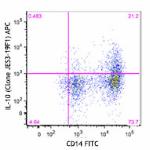
LPS-stimulated human peripheral blood mononuclear cells (PBM... 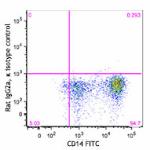
-
PE anti-human IL-10
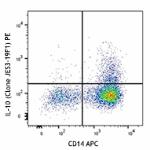
LPS-stimulated (in the presence of monensin, 18 hours) human... 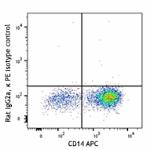
-
Purified anti-human IL-10
-
PE/Dazzle™ 594 anti-human IL-10
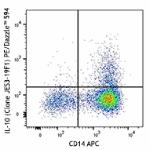
LPS-stimulated (in the presence of monensin, 18 hours) human... 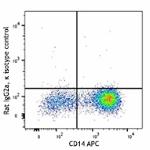
-
Ultra-LEAF™ Purified anti-human IL-10
